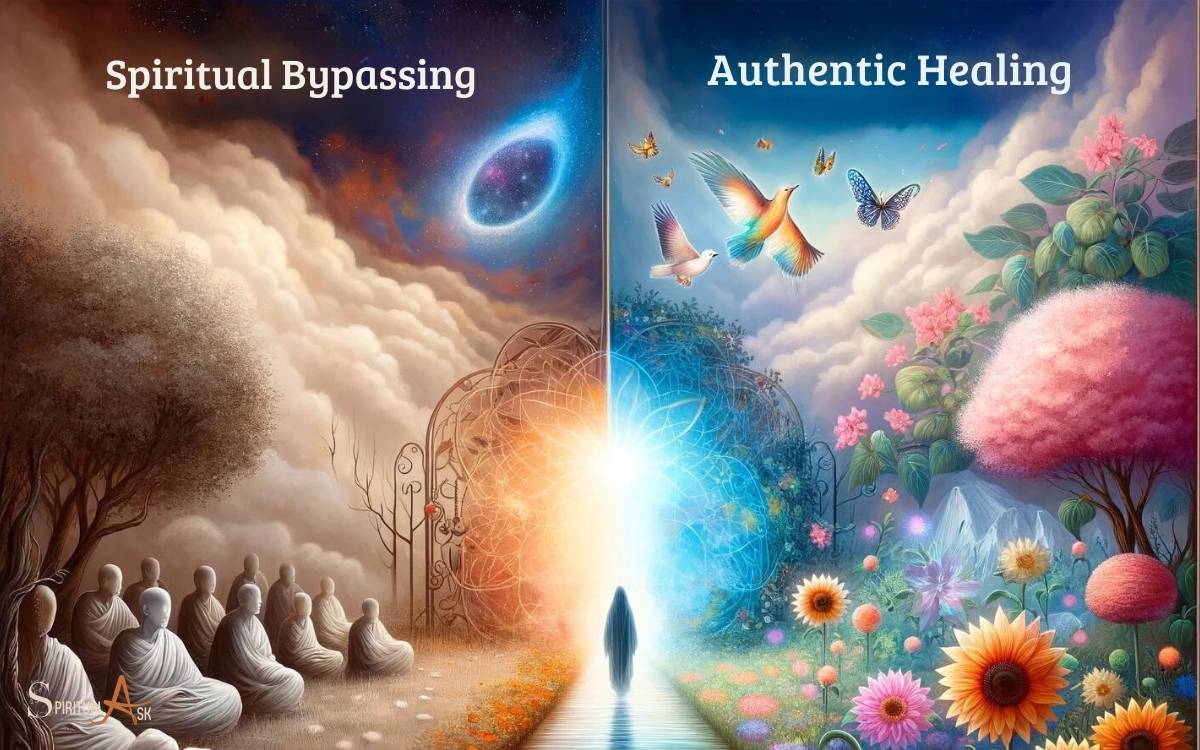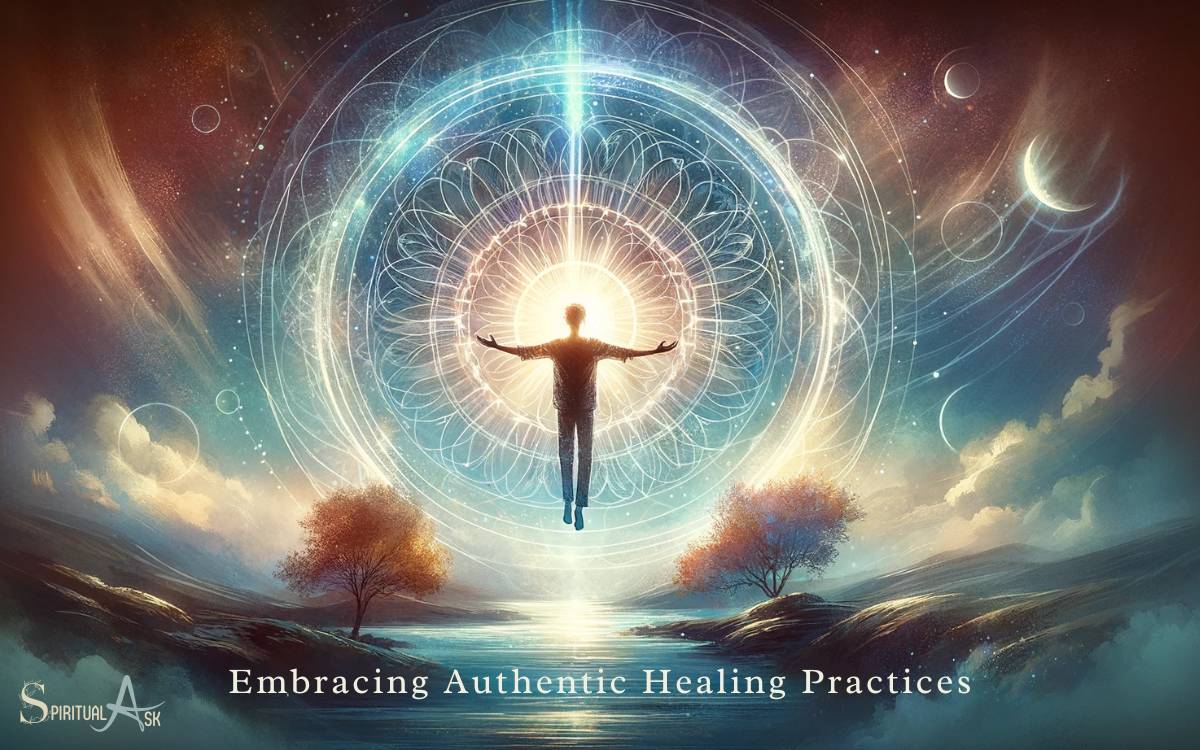Spiritual Bypassing Vs Authentic Healing: Comparison!
Spiritual bypassing is a tendency to use spiritual ideas and practices to sidestep or avoid facing unresolved emotional issues, psychological wounds, and unfinished developmental tasks.
This term was first coined by psychologist John Wellwood in the 1980s. In contrast, authentic healing involves confronting and processing these emotional challenges and traumas through a holistic approach that integrates spirituality with emotional and psychological work.
Spiritual bypassing can manifest in various ways, such as overemphasizing positivity, adopting spiritual beliefs uncritically, or engaging in complex rituals without addressing underlying personal issues.
This avoidance can lead to a superficial sense of peace that doesn’t hold up under stress. Authentic healing, on the other hand, encourages self-exploration and the acceptance of all emotions, both positive and negative.
It encompasses various therapeutic practices that may include mindfulness, meditation, psychotherapy, and other methods that promote genuine growth and healing.
Examples of spiritual bypassing versus authentic healing:
To truly heal, it’s crucial to move beyond spiritual bypassing and embrace the journey of authentic healing, which requires courage to face our innermost challenges.

Key Takeaway
Understanding Spiritual Bypassing
Let me explain what spiritual bypassing is. It’s a defense mechanism that people use to avoid dealing with uncomfortable emotions or unresolved issues by seeking refuge in spirituality or personal development.

Instead of addressing the root cause of their struggles, they use spiritual practices or beliefs to bypass the necessary inner work.
This can manifest as denying the existence of negative emotions, projecting a false sense of positivity, or using spiritual beliefs to escape from facing difficult realities.
While spirituality can be a powerful tool for growth and healing, spiritual bypassing hinders genuine progress by masking deeper emotional wounds.
It’s important to recognize that true healing involves confronting and working through our pain rather than simply transcending it through spiritual practices.
Signs and Symptoms of Spiritual Bypassing
As I reflect on my own spiritual journey, it’s become clear to me that avoiding emotional pain, engaging in superficial positivity and optimism, and experiencing a disconnection from reality are all signs of spiritual bypassing.

These behaviors may seem like a way to transcend difficult emotions, but in reality, they only serve to suppress and ignore the deeper issues at hand. Recognizing these signs is the first step towards authentic healing and spiritual growth.
Avoiding Emotional Pain
I’m in the habit of skirting around my emotional pain rather than facing it head-on. It’s easier to distract myself with spiritual practices, positive affirmations, or even numbing substances rather than truly acknowledging and processing my emotions.
Avoiding emotional pain is a common sign of spiritual bypassing. When I find myself constantly trying to stay positive or dismissing my feelings as “negative energy,” I may be engaging in this behavior.
Other signs include an excessive focus on love and light while denying the existence of darkness and shadow within myself.
It’s important to recognize these tendencies and allow myself to sit with my emotions, no matter how uncomfortable they may be. Authentic healing comes from confronting and working through my emotional pain, not avoiding it.
Superficial Positivity and Optimism
Skirting around emotional pain with superficial positivity and optimism is a common sign of spiritual bypassing. It’s often easier to put on a happy face and pretend everything is fine rather than facing the discomfort that comes with acknowledging and working through our true feelings.
This can lead to a superficial approach to healing, where we attempt to cover up our pain with a veneer of positivity without addressing the underlying issues.
While positivity and optimism can be beneficial, using them to avoid dealing with genuine emotions can hinder our healing process.
It’s essential to recognize that true healing involves facing our emotions head-on, rather than simply plastering a smile over our pain.
By diving into our feelings, we can embark on a journey of authentic healing. This leads us to the next topic of ‘disconnection from reality’, where we will explore the impact of avoiding the truth.
Disconnection From Reality
One key indicator of spiritual bypassing is the tendency to disconnect from the harsh realities of our emotions and experiences.
It’s like wearing rose-colored glasses that prevent us from acknowledging the pain and struggles we’re facing. Instead of confronting and processing these difficult emotions, we may try to bypass them with superficial positivity or spiritual practices.
This disconnection from reality can manifest as denial, avoidance, or a constant need to escape into spiritual beliefs or practices without addressing the underlying issues.
We might find ourselves using spiritual concepts to bypass dealing with tangible problems, which only serves as a temporary band-aid.
By recognizing these signs of disconnection and embracing the full spectrum of our experiences, we can move towards authentic healing and true spiritual growth.
The Impact of Spiritual Bypassing
When we avoid facing our emotions, we hinder our ability to heal and grow authentically. Spiritual bypassing can give us a false sense of enlightenment, preventing us from addressing our true inner struggles.

By bypassing emotional work, we stifle our genuine growth and development as individuals.
Avoiding Emotional Work
I find myself evading uncomfortable emotions through spiritual practices, hindering my genuine healing process. It’s easy to turn to meditation, affirmations, or other spiritual activities as a way to bypass the difficult feelings that arise.
However, by doing so, I’m only skimming the surface of my inner turmoil, rather than truly addressing and resolving it.
This avoidance can lead to a buildup of unresolved emotions, which may eventually manifest in harmful ways such as anxiety, depression, or even physical ailments.
It’s crucial to recognize that authentic healing requires facing and processing these emotions, not bypassing them.
By acknowledging and working through our emotional struggles, we open the door to genuine growth and transformation.
False Sense of Enlightenment
The impact of spiritual bypassing, it’s crucial to recognize how avoiding emotional work through spiritual practices can create a false sense of enlightenment.
This false sense of enlightenment can have detrimental effects, including:
- Emotional Disconnection: It can lead to a disconnection from our true emotions, preventing us from addressing and resolving underlying issues.
- Superficial Growth: We may feel a superficial sense of growth and development without truly delving into the depths of our emotional and psychological needs.
- Spiritual Arrogance: It can foster a sense of spiritual superiority, leading to judgment of others’ emotional struggles and a lack of empathy.
These effects can hinder genuine healing and personal development, perpetuating a cycle of emotional avoidance. Recognizing and addressing these impacts is crucial in our journey towards authentic healing and growth.
Stifling Genuine Growth
Understanding the impact of spiritual bypassing, it becomes evident how it stifles genuine growth and hinders authentic healing.
When individuals engage in spiritual bypassing, they often use spiritual practices or beliefs to avoid dealing with their emotional wounds and unresolved issues.
This avoidance prevents them from truly facing and working through their challenges, leading to a false sense of progress and enlightenment.
Instead of fostering genuine growth, spiritual bypassing creates a superficial facade of healing, leaving underlying issues unaddressed.
As a result, individuals may find themselves stuck in repetitive patterns and unresolved pain, hindering their journey towards authentic healing.
Recognizing the stifling effect of spiritual bypassing is crucial in paving the way for true inner transformation and genuine growth.
The Essence of Authentic Healing

In my experience, authentic healing involves facing and addressing our emotional pain rather than bypassing it through spiritual practices.
It’s about delving into our deepest wounds and allowing ourselves to feel the discomfort, sadness, and anger that we’ve been carrying.
Authentic healing requires us to:
- Embrace vulnerability and acknowledge our pain, rather than suppressing or denying it.
- Cultivate self-compassion and kindness towards ourselves as we navigate through the difficult emotions.
- Seek professional help or support from trusted individuals to process and work through our emotional struggles.
Navigating Through Authentic Healing

As a practitioner of authentic healing, I have found that navigating through the process requires a deep commitment to facing and working through emotional pain. It’s essential to create a safe space for acknowledging and processing difficult emotions.
This involves embracing vulnerability and learning to sit with discomfort instead of bypassing it. Authentic healing also involves cultivating self-compassion and patience, recognizing that healing is a journey with its own timeline.
Seeking support from trusted individuals or professionals can provide valuable guidance and validation throughout this process.
It’s important to approach healing with an open mind and a willingness to explore different modalities that resonate with personal beliefs and experiences.
Ultimately, navigating through authentic healing involves a dedication to self-discovery, growth, and inner transformation.
Integrating Spirituality and Emotional Healing

Integrating spirituality with emotional healing involves deep introspection and connection with a higher power.
It’s a journey that requires patience, vulnerability, and a willingness to confront our innermost fears and insecurities. It’s about understanding our emotional wounds and allowing spirituality to guide us towards healing.
Here are three key aspects to consider:
- Self-Compassion: Learning to be gentle with ourselves and offering kindness in moments of emotional pain.
- Mindfulness Practices: Engaging in meditation and mindfulness to cultivate awareness of our emotions and thoughts.
- Gratitude and Surrender: Embracing gratitude for the lessons learned from our emotional wounds and surrendering to the process of healing.
By integrating spirituality with emotional healing, we can begin to unravel the layers of our pain and find a path towards genuine and lasting healing.
This integration sets the stage for embracing authentic healing practices, which will be explored in the subsequent section.
Embracing Authentic Healing Practices

Embracing authentic healing practices entails acknowledging my vulnerabilities and actively working towards genuine emotional and spiritual growth. It involves being honest with myself about my struggles and seeking out effective ways to address them.
This means embracing practices such as mindfulness, therapy, self-reflection, and seeking support from trusted individuals.
Authentic healing also involves facing difficult emotions and experiences head-on, rather than attempting to bypass or ignore them.
By doing so, I can cultivate a deeper understanding of myself and develop the resilience needed to navigate life’s challenges.
Authentic healing isn’t always easy, but it’s a necessary part of my journey towards wholeness and well-being. It requires patience, self-compassion, and a willingness to engage in the often messy and uncomfortable work of inner growth.
Conclusion
In the journey of healing, it’s important to avoid spiritual bypassing and embrace authentic healing. By bypassing the hard work of emotional and psychological healing, individuals only mask their pain and prevent true growth and transformation. Authentic healing requires facing inner turmoil, working through past traumas, and seeking support from a qualified therapist or healer. By embracing this process, individuals can experience the profound spiritual healing benefits of inner peace, self-discovery, and a deep sense of wholeness. These benefits extend beyond the individual, positively impacting their relationships, work, and overall well-being.
By recognizing the signs and symptoms of spiritual bypassing and understanding its impact, we can navigate through authentic healing practices.
It’s like peeling back the layers of an onion, uncovering our true selves and allowing for genuine growth and transformation. Let’s choose the path of authentic healing, where our spirits can truly flourish.






